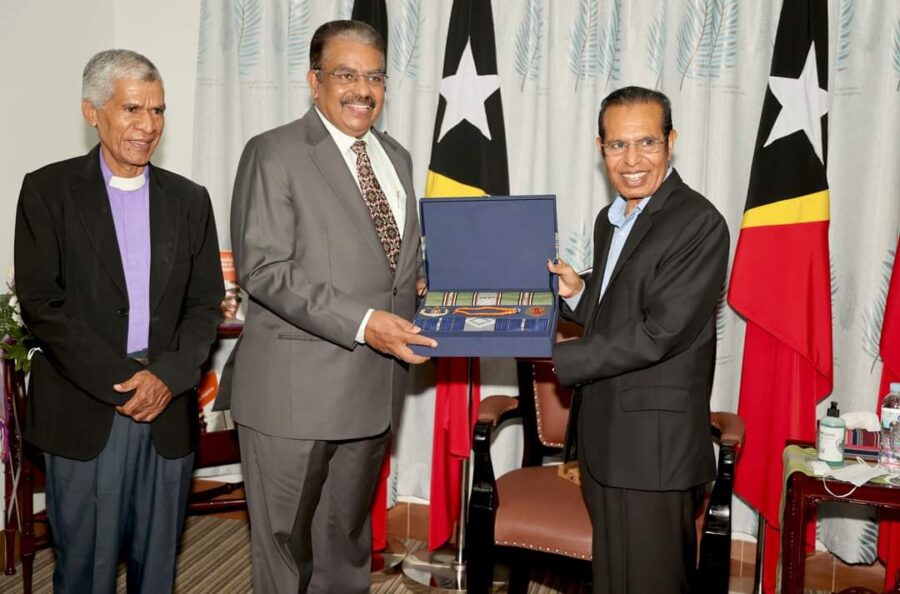Timor Leste Prime Minister applauds ecumenical accompaniment and solidarity during the country’s long years of struggle for right to self-determination
 CCA General Secretary Dr. Mathews George Chunakara receives a gift from Timor Leste Prime Minister José Maria Vasconcelos
CCA General Secretary Dr. Mathews George Chunakara receives a gift from Timor Leste Prime Minister José Maria Vasconcelos
Prime Minister of the Democratic Republic of Timor Leste, José Maria Vasconcelos, in an audience with CCA General Secretary Dr Mathews George Chunakara, applauded the solidarity and accompaniment of the worldwide ecumenical family, especially the Christian Conference of Asia (CCA) and the World Council of Churches (WCC), extended to the people of Timor Leste over the years, in their struggle for right to self-determination.
In an hour-long meeting held at the Prime Minister’s official residence in the capital Dili, on 22 September 2022, the veteran Timor Leste’s freedom struggle leader, popularly known as Taur Matan Ruak, welcomed and appreciated the visit of the CCA General Secretary, and thanked CCA for having assisted the people’s movement and their struggle against Indonesian occupation of that country for such a long time.
The Prime Minister expressed deep appreciation on behalf of the people Timor Leste to CCA and other ecumenical family members across the world for advocating for the right to self-determination, and supporting global advocacy against militarization and gross human rights violations perpetrated by the Indonesian Army during its occupation of the country from 1975 to 1998.
Dr Mathews George Chunakara briefed the Prime Minister about CCA’s advocacy initiatives in the 1980s and 1990s, especially the campaign against militarization and human rights violations in the erstwhile East Timor. The Working Group jointly initiated by CCA and WCC mobilised international ecumenical support for East Timor’s independence.
The CCA General Secretary recollected the beginning of the ecumenical accompaniment and solidarity with the impoverished masses on the request of the Igreja Protestante iha Timor Loro Sa'e (IPTL), a member church of both CCA and WCC. Dr Chunakara recalled the names of several IPTL leaders who were active in the national liberation movement and closely linked to CCA and WCC in the 1980s and 1990s.
Prime Minister Taur Matan Ruak told the CCA General Secretary that he was personally aware of CCA’s and other Asian churches’ support during the dark years in the history of his country, and he himself was in the forefront of the independence movement, fighting against the occupying Indonesian forces for 24 years in his life.
On 7 December 1975, Indonesia invaded Timor Leste, and Taur Matan Ruak, then 19, joined the newly formed National Liberation Armed Forces of Timor-Leste (FALINTIL) in the mountains. From 1986, he took command of all military operations in Timor Leste. Subsequently he became Commander-in-Chief of FALINTIL.
The one-time freedom fighter and Commander-in-Chief of the liberation force in the country, Prime Minister Taur Matan Ruak told the CCA leader, who visited him together with the leaders of CCA’s member church, the IPTL, that although he was a member of the Roman Catholic Church, most of his immediate family members belonged to the Protestant Church in the country, and several of them have been in the leadership of the Protestant Church in the country since the era of Portuguese colonial rule.
The Prime Minister explained the significant progress his country has made in the period since independence despite a lack of infrastructure, human capital, and financial resources. He outlined several issues the country hopes to tackle in the years ahead, including Timor Leste’s integration into the international system.
He added that Timor Leste hopes to be admitted as a member state into the Association of South East Asia Nations (ASEAN) in the near future.
Taur Matan Ruak has been serving as the prime minister of East Timor since June 2018. He was also President of East Timor from 20 May 2012 to 20 May 2017.
The CCA General Secretary was accompanied by the IPTL leaders Rev. Moises A. da Silva, Rev. Martinho Faria, and Rev. Juliana Temparadja.










